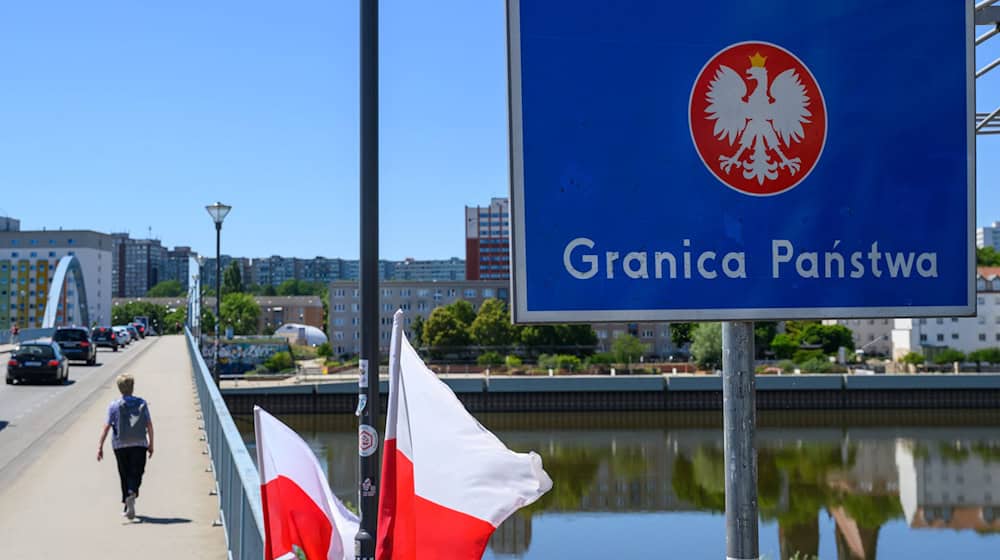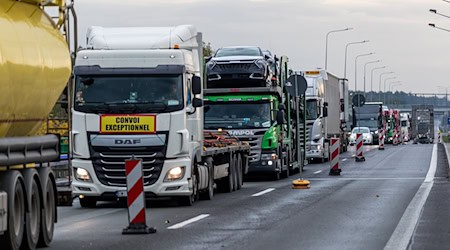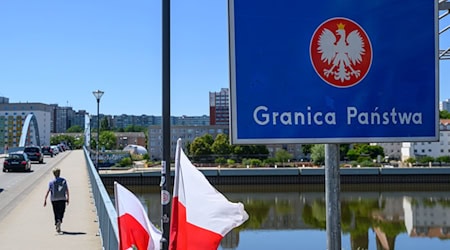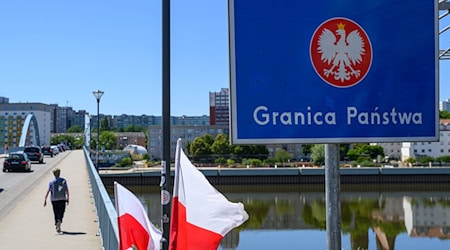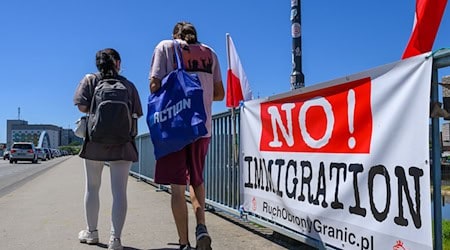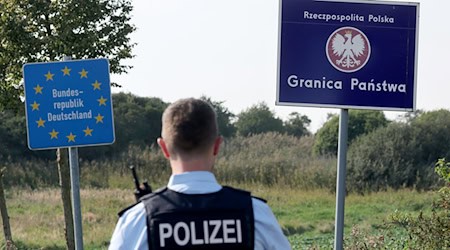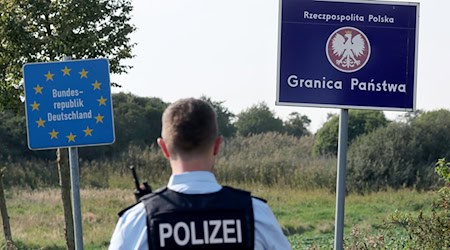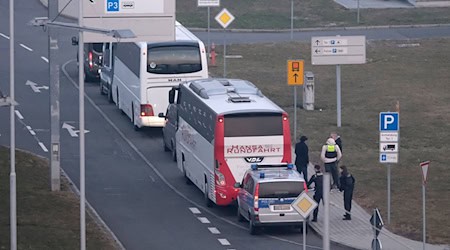From October 2023, anyone entering Germany from Poland will have to be prepared for German border controls. The German government wants to curb irregular migration. The result is often long traffic jams on the Polish side.
Now Poland is reacting. From this Monday until 5 August, travelers, commuters and trucks will also be checked in the opposite direction, i.e. on the Polish side. It is a far-reaching decision with consequences that are not entirely foreseeable.
What do the border controls mean for travelers from Germany?
People will have to be prepared for waiting times at the Polish border. The random checks will mainly affect buses, minibuses and cars with many occupants, as Konrad Szwed from the Polish Border Guard told the news agency PAP. "Vehicles with tinted windows will also be in focus." There will be no barriers or barriers. However, the lanes in front of the checkpoints will either be narrowed or signs will be put up to slow down traffic.
However, the entry rules themselves will not change. Poland has been a member of the European Union since 2004 and part of the Schengen area since 2007, which actually promises unlimited freedom of travel. An identity card is therefore sufficient for travel, a passport is not required.
What do they mean for commuters and small border traffic?
For commuters in particular, the German controls have long been a burden - and now those on the Polish side are being added to this, complains Saxony's Economics Minister Dirk Panter (SPD). "Long waiting times, planning uncertainty and disrupted goods traffic ultimately harm everyone involved." The spokesperson for Poland's border police said that officials were making every effort to allow commuters from areas close to the border to pass through without long delays.
In Saxony alone, 13,000 people commute from Poland every day. According to the chambers of industry and commerce, more than 14,000 people commute to Brandenburg every day. In the border region, many people from Germany also travel to Poland to fill up their tanks or do their shopping, where low prices are tempting. With controls on both sides, Brandenburg's Interior Minister René Wilke fears "possible traffic collapses". Hundreds of thousands would be affected.
How did this actually come about?
Germany began the controls in 2023 to prevent migrants without the necessary papers from entering the country. The rules were tightened when the new federal government took office at the beginning of May: unlike before, people who express a request for asylum can now also be turned away.
The preliminary results of the Federal Police: Since 8 May, 7,960 unauthorized entries have been registered at all German land borders and 6,193 people have been directly turned back or deported (as of 1 July). This included 285 people who had applied for asylum. According to the Ministry of the Interior, there were around 1,300 rejections at the German-Polish border alone, with one in ten cases involving a request for asylum.
Why is Poland reacting now?
This is primarily for domestic political reasons. The rejections from Germany are an irritating issue for many Poles. The right-wing conservative opposition party PiS is seizing on this to combine anti-German resentment with stoking fear of migrants. PiS representatives accuse Donald Tusk's pro-European government of willingly accepting large numbers of migrants from Germany and having no control over the situation at the border. The PiS, whose candidate Karol Nawrocki recently won the presidential election, is hoping for a return to power. It had increased the pressure on Tusk until he decided to introduce border controls.
Who is behind the Polish vigilante groups at the border?
For some time now, Polish right-wing extremists have been organizing patrols that stop vehicles at border crossings on their own authority, ask passers-by for documents and search for migrants. Behind the "Movement for the Defence of Borders" is Robert Bakiewicz, a well-known right-wing extremist in Poland, who organizes annual right-wing marches in Warsaw on Polish Independence Day. These groups are a thorn in the side of the government in Warsaw. Interior Minister Tomasz Siemoniak has announced that cases of insolence and insulting officials will be punished consistently.
Will asylum seekers now be sent back and forth?
This is what the police union fears. Federal Interior Minister Alexander Dobrindt (CSU), on the other hand, is convinced that there will be no such "ping-pong game". He emphasizes the good cooperation between the federal police and the Polish border guards.
In practice, we hear that disagreements are indeed rare. Shortly after the tightened border controls began in May, Poland refused entry to two Afghan men who had entered Brandenburg near Guben without permission and said they wanted to apply for asylum. They were then taken to the initial reception center in Eisenhüttenstadt.
What does the economy say?
The chambers of industry and commerce in Brandenburg are speaking of an escalation and sounding the alarm. Poland is Brandenburg's most important foreign trade partner: in 2024, exports worth 4.1 billion euros went from the federal state to its eastern neighbors and goods worth 4.5 billion euros went in the opposite direction.
But Brandenburg, Saxony and Mecklenburg-Western Pomerania are still often transit points for goods traffic with Eastern Europe. According to the logistics association BGL, the 2024 toll statistics record a good 9.7 million entries and exits of trucks subject to tolls at the German-Polish border crossings. The Federation of Business Associations in Berlin and Brandenburg warns that congestion could lead to losses. Obstacles in Europe and delays in crossing the border would have an impact on the entire EU economic area, the chambers of industry and commerce added.
Polish transport companies are also concerned. The companies would largely serve production lines in factories in Western Europe with components manufactured in Poland, said Jan Buczek, Chairman of the Polish Association of International Transport Companies, to the newspaper "Dziennik Gazeta Prawna". The goods had to be delivered on time, and delays could result in penalties for the manufacturer and the supplier. He fears that the Polish side will carry out one hundred percent checks, which could lead to a blockade of several hours or even several days on the return journey.
Is borderless freedom of travel in Europe at an end?
No, but checks are now being carried out again in many places in the Schengen area - although this should actually be a temporary exception. Former Federal Minister of the Interior Nancy Faeser (SPD) introduced controls at the eastern borders in October 2023 and then at all German land borders from September 2024.
Austria controls the borders with Hungary and Slovenia. France, the Netherlands and Slovenia are also making use of this option. The main reason given for this is that there is too much irregular migration. In some cases, however, security issues also play a role, such as in France, which also cites terrorist threats as justification.
How long will this last?
The Polish controls are initially limited until August 5. But it is impossible to predict when the situation will normalize overall. It depends, among other things, on how the rules of the Common European Asylum System (CEAS) prove themselves in practice. They are to apply from mid-June 2026. The reform provides for people seeking protection to be registered at the EU's external borders in future, including identity verification and biometric data. For people from countries with a low recognition rate, there will be accelerated asylum procedures at the external borders.
Copyright 2025, dpa (www.dpa.de). All rights reserved

